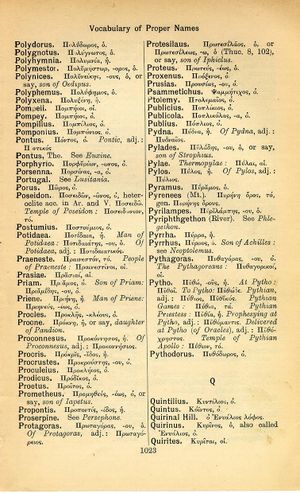Prometheus: Difference between revisions
(D_7) |
(Gf-D_7) |
||
| Line 1: | Line 1: | ||
{{WoodhouseENELnames | {{WoodhouseENELnames | ||
|Text=[[File:woodhouse_1023.jpg|thumb|link= | |Text=[[File:woodhouse_1023.jpg|thumb | ||
|link={{filepath:woodhouse_1023.jpg}}]][[Προμηθεύς]], -έως, ὁ, or say, <b class="b2">son of Iapetus.</b> | |||
}} | }} | ||
{{Lewis | {{Lewis | ||
| Line 6: | Line 7: | ||
}} | }} | ||
{{Gaffiot | {{Gaffiot | ||
|gf=<b>Prŏmētheūs</b>¹² (trissyll.), ĕī ou ĕos, m. ([[Προμηθεύς]]), Prométhée [fils de Japet, frère d’Épiméthée, père de [[Deucalion]], fit l’homme d’argile et l’[[anima]] avec le feu du ciel qu’il avait dérobé ; en punition il fut attaché sur le Caucase, où un vautour lui rongeait le foie ; il fut délivré par Hercule] : Cic. Tusc. 3, 76 || [poét.] un habile potier : Juv. 4, 133 || <b>-ēus</b>, a, um, de Prométhée : Promethea [[juga]] Prop. 1, 12, 10, le Caucase. | |gf=<b>Prŏmētheūs</b>¹² (trissyll.), ĕī ou ĕos, m. ([[Προμηθεύς]]), Prométhée [fils de Japet, frère d’Épiméthée, père de [[Deucalion]], fit l’homme d’argile et l’[[anima]] avec le feu du ciel qu’il avait dérobé ; en punition il fut attaché sur le Caucase, où un vautour lui rongeait le foie ; il fut délivré par Hercule] : Cic. Tusc. 3, 76 || [poét.] un habile potier : Juv. 4, 133 || <b>-ēus</b>, a, um, de Prométhée : Promethea [[juga]] Prop. 1, 12, 10, le Caucase.||[poét.] un habile potier : Juv. 4, 133||<b>-ēus</b>, a, um, de Prométhée : Promethea [[juga]] Prop. 1, 12, 10, le Caucase. | ||
}} | }} | ||
Revision as of 07:45, 14 August 2017
English > Greek (Woodhouse)
Προμηθεύς, -έως, ὁ, or say, son of Iapetus.
Latin > English (Lewis & Short)
Prŏmētheus: (trisyl.), ĕi and ĕos, m., =Προμηθεύς (the Forethinker),
I a son of Iapetus and Clymene, brother of Epimetheus, and father of Deucalion. He formed men of clay, and animated them by means of fire brought from heaven; for which he was fastened to Caucasus, where a vulture, or, as some say, an eagle, fed upon his entrails, until, at last, it was slain by Hercules, Cic. Tusc. 3, 31, 76; Auct. Her. 4, 6, 9; Hor. C. 1, 16, 13; Ov. M. 1, 82; Hyg. Fab. 54; 144; Verg. E. 6, 42; Prop. 3, 3, 29 (4, 4, 7); Mart. 11, 85, 9; Stat. Th. 11, 478; Lact. 2, 10, 5.—Poet., transf., of a skilful potter, Juv. 4, 133.—Hence,
A Prŏmēthēus, a, um, adj., of or belonging to Prometheus, Promethean: juga, i. e. the Caucasus, Prop. 1, 12, 10; also called rupes, Mart. 9, 46, 3: fibra, of Prometheus, Val. Fl. 7, 356: creta, Col. poët. 10, 59: lutum, Mart. 10, 39, 4: cruor, Ov. Am. 2, 16, 40: manus, Stat. Th. 8, 305.—
B Prŏmēthĭădes, ae, m. patron., the son of Prometheus, Deucalion, Ov. M. 1, 390.
Latin > French (Gaffiot 2016)
Prŏmētheūs¹² (trissyll.), ĕī ou ĕos, m. (Προμηθεύς), Prométhée [fils de Japet, frère d’Épiméthée, père de Deucalion, fit l’homme d’argile et l’anima avec le feu du ciel qu’il avait dérobé ; en punition il fut attaché sur le Caucase, où un vautour lui rongeait le foie ; il fut délivré par Hercule] : Cic. Tusc. 3, 76 || [poét.] un habile potier : Juv. 4, 133 || -ēus, a, um, de Prométhée : Promethea juga Prop. 1, 12, 10, le Caucase.

